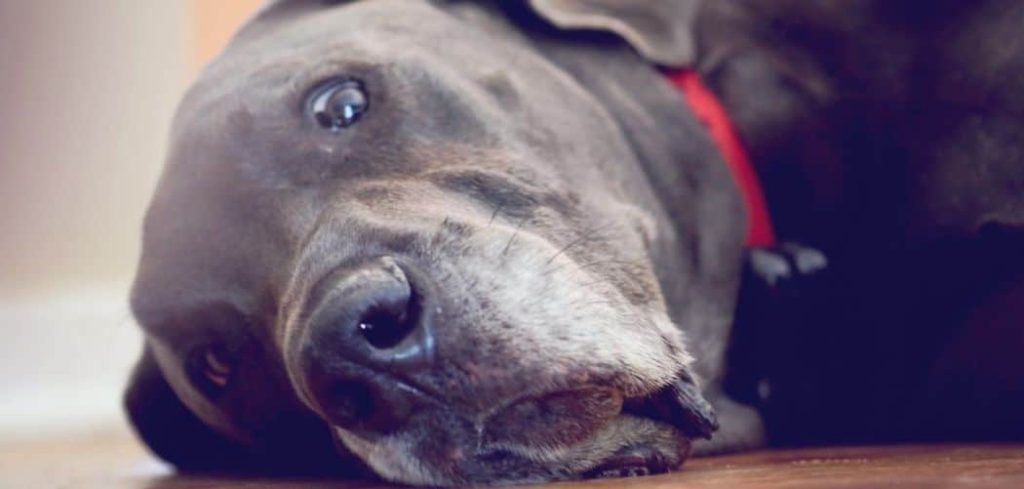It can be alarming to notice your dog panting heavily and pacing around at night instead of sleeping.
Nighttime restlessness can disrupt both your pet’s rest and your own, and it often points to discomfort or an underlying health problem.
We outline the common reasons why your dog is panting and restless at night, what you can do at home, and when to seek veterinary help.
Table of Contents
Dog Panting and Restless at Night — Why It Happens
Panting and restlessness at night in dogs can be triggered by a mix of physical discomfort, anxiety, and medical issues. Pain from arthritis, digestive upset, or injuries can make it difficult for your dog to settle. Anxiety from loud noises, separation, or changes in routine can keep them pacing.
Medical conditions such as heart disease, respiratory problems, or hormonal imbalances can also cause nighttime distress.
Environmental factors like heat or lack of comfort may play a role as well.

Reasons Why Your Dog Is Panting and Restless at Night
Anxiety or Stress
Dogs can experience anxiety for many reasons, including separation from their owners, recent changes in their environment, or even storms and fireworks.
Anxiety often peaks at night when the household becomes quiet and dark.
Panting is one of the body’s responses to stress, and restlessness can follow as your dog searches for comfort or reassurance.
If anxiety is frequent and severe, it can impact your dog’s sleep patterns and overall health.
Read more: Dog Panting Excessively and Restless (Here’s why)
Pain or Discomfort
Pain from arthritis, joint injuries, dental problems, or recent surgery can make it hard for a dog to find a comfortable position.
At night, when distractions are fewer, your dog may become more aware of the discomfort.
Panting is a common reaction to pain because it helps dogs cope with stress and discomfort.
Prolonged pain can lead to chronic restlessness, fatigue, and reduced quality of life.
Heart Disease
Heart problems can cause dogs to pant more, especially at night, due to fluid buildup or reduced oxygen circulation.
Restlessness may occur as they try to find a position that allows easier breathing.
Other symptoms can include coughing, fatigue, and decreased exercise tolerance.
Because heart disease can worsen quickly, early detection and treatment are essential.
Respiratory Issues
Conditions like asthma, bronchitis, collapsing trachea, or lung disease can make breathing more difficult, especially when your dog is lying down.
Nighttime can exacerbate breathing problems, leading to panting and frequent repositioning.
If untreated, respiratory problems can escalate into emergencies.
Hormonal Disorders (Cushing’s Disease)
Cushing’s disease causes excess cortisol production, which can lead to panting, increased thirst, and restlessness at all hours.
Symptoms may be more obvious at night when your dog is supposed to be sleeping.
It’s a progressive condition that needs veterinary diagnosis and management.
Environmental Factors
Overheating, a too-warm sleeping area, or insufficient bedding comfort can also cause your dog to pant and pace. Some dogs are more sensitive to heat or drafts at night.
Making simple changes to the environment can sometimes resolve the issue.
What to Do If Your Dog Is Panting and Restless at Night
First, make sure your dog is in a comfortable, cool, and quiet sleeping area. Ensure fresh water is available nearby so they can hydrate if they feel warm.
If anxiety is suspected, consider calming aids such as a weighted blanket, white noise machine, or pheromone diffusers. Gentle nighttime routines can help reduce stress.
Monitor for any signs of pain or injury, and keep a log of when symptoms occur to share with your vet. This can help pinpoint triggers and underlying issues.
Avoid heavy exercise, large meals, or high excitement right before bedtime, as these can contribute to nighttime restlessness.
When to Call or Visit Your Vet
Seek veterinary attention promptly if your dog’s panting is accompanied by coughing, wheezing, or noticeable breathing difficulty.
These could indicate heart or respiratory issues that require urgent care.
If your dog seems in pain, is reluctant to move, or shows sudden behavioral changes, schedule a vet visit as soon as possible.
Persistent or worsening nighttime restlessness despite home adjustments also warrants professional evaluation.
Finally, any signs of collapse, severe lethargy, or blue-tinged gums require immediate emergency care.
Read more: Why Is My Old Dog Panting and Restless at Night? (Should you worry?)
Key Takeaway
Nighttime panting and restlessness in dogs can stem from anxiety, pain, medical conditions, or environmental discomfort.
While some causes are minor and can be managed at home, others require prompt veterinary care.
By observing your dog closely, making their sleeping environment comfortable, and seeking professional help when necessary, you can help your dog get the restful nights they need for a healthy, happy life.
